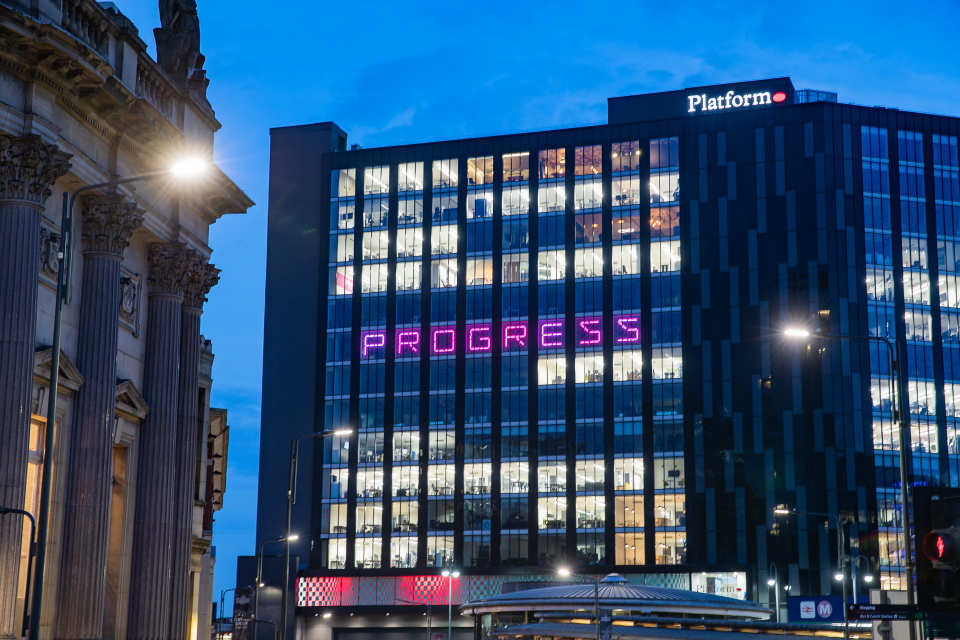What Have We Learned From COP26 This Year?
By Bruntwood

COP26 comes to a close today. But what have we learned? Here’s a rundown of the points we think are important in the transition to Net Zero Carbon.
Transport - It is often suggested that slow speeds, particularly in rush hour, put people off using the bus rather than driving, particularly those living too far away from work to cycle or walk. Local and national governments, with city councils, need to do more to improve regional infrastructure, allowing buses to avoid congestion on the roads. By improving the efficiency of bus services, more people are likely to leave the car at home. Equally, investments in a Net Zero rail network would be hugely significant since rail is already a low carbon mode of transport which provides high speed connections. Improving intercity (as well as intra-city) links between the economic powerhouses of the North will also be crucial to moving forward with the Levelling Up agenda.
Business and Investment - It is clear that significant financial investment is needed to meet the challenges to tackle climate change. This is the case not just as a method to reduce emissions, but also to successfully promote changes in behaviour towards the effects of climate change which are already being experienced. As the Prime Minister said recently, “Governments can mobilise billions to fight climate change, but the private sector can mobilise trillions” - obviously, we need serious investment from private enterprise. But it doesn’t take a sharp business mind to see that the costs of these investments are far outweighed by the benefits. Commercial leaders and private investors can come together to build economic and strategic resilience towards the impacts of climate change, putting our towns, cities and regions - and ultimately, our world - in the best position to protect the planet.
Jobs - This change in focus within regional, national and global business communities is already happening. As a result, more and more opportunities continue to arise for improved skills and employment - and this is on a steep upward trajectory. As new trends and challenges emerge, an increasing number of sectors are aligning themselves with a Net Zero approach. Bruntwood SciTech’s Market Spotlight Report recently showed that the science and technology sectors will be responsible for an estimated two-thirds of all Net Zero jobs by 2050. And only yesterday Amer Gaffar, Director of the Manchester Fuel Cell Innovation Centre at Manchester Metropolitan University and Founder of the Greater Manchester Hydrogen Partnership, said: “Every job is going to be a Net Zero job” - indicating the sheer pace and scale of the changes happening on the commercial landscape. Again, this is a sign that while the world undoubtedly faces the greatest existential challenge it has ever encountered, it also faces some of the most exciting opportunities to learn, grow and improve on a global, national and individual level.
Health - It was widely discussed this week that, unless the world meets the Paris Agreement’s target of limiting global warming to 1.5 degrees above pre-industrial levels (more about this here), then we should expect to see a vast increase in climate-linked health conditions. This editorial, which appeared in 233 health journals, warned that exceeding the 1.5 degree-limit would mean “catastrophic harm to health that will be impossible to reverse.” Former Prime Minister Gordon Brown, who now acts as the ambassador on global health finance for the World Health Organisation, also said : “Although COVID has been a deadly disease, climate change will take more lives in the next 50 to 100 years”, adding, “we need to keep 1.5 degrees alive to keep millions of people alive”. This is a challenge faced on two fronts by healthcare services who, along with a real risk of becoming overwhelmed by the impacts of climate-linked disease, must also address their role as emitters. Globally, health systems are thought to account for around 5% of greenhouse gas emissions and this week, all four health systems in the UK made a commitment at COP26 to reach Net Zero.
All of the elements mentioned above are key components of our cities and regions, and indeed the world at large. What we believe - all the more strongly in the wake of COP26 - is that each of these elements will be key in making those cities and regions strong enough to reach the ambitious and urgent targets of the Paris Agreement. This is why a comprehensive business strategy, driven by our purpose of Creating Thriving Cities, is so vital to our approach.
Everything we do supports the three main themes of that core purpose: Cultural Vibrancy; Fairness and Equality; and, of course, Sustainability. Our work to build sustainable communities creates more jobs, leading to a fairer and more equal society; keeps people in our city regions healthier by using greener solutions; and encourages cultural vibrancy by bringing communities together in revived public spaces. But this isn’t just about what we’re doing - the race to Net Zero can only be won through a strategic approach which brings all elements of our great cities together, and allows them to thrive and collaborate. That’s why our central purpose is so important to us as we now reflect on the past two weeks, and think about our plans for the future.
Stay Connected!
Sign up to our newsletter for the latest news, updates and offers.